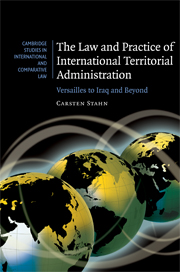Book contents
- Frontmatter
- Contents
- Foreword
- Preface
- Selected table of cases
- List of abbreviations
- Table of engagements
- Introduction
- Part I The historical and social context of international territorial administration
- Introduction
- 1 The concept of internationalisation
- 2 The Mandate System of the League of Nations
- 3 The United Nations Trusteeship System
- 4 Post-war occupation
- 5 UN territorial administration and the tradition of peace-maintenance
- Conclusion: international territorial administration – an independent device with a certain normative heritage
- Part II The practice of international territorial administration: a retrospective
- Part III The foundations of international territorial administration
- Part IV A typology of legal problems arising within the context of international territorial administration
- Part V International territorial administration at the verge of the twenty-first century: achievements, challenges and lessons learned
- Bibliography
- Index
- CAMBRIDGE STUDIES IN INTERNATIONAL AND COMPARATIVE LAW
Conclusion: international territorial administration – an independent device with a certain normative heritage
Published online by Cambridge University Press: 19 January 2010
- Frontmatter
- Contents
- Foreword
- Preface
- Selected table of cases
- List of abbreviations
- Table of engagements
- Introduction
- Part I The historical and social context of international territorial administration
- Introduction
- 1 The concept of internationalisation
- 2 The Mandate System of the League of Nations
- 3 The United Nations Trusteeship System
- 4 Post-war occupation
- 5 UN territorial administration and the tradition of peace-maintenance
- Conclusion: international territorial administration – an independent device with a certain normative heritage
- Part II The practice of international territorial administration: a retrospective
- Part III The foundations of international territorial administration
- Part IV A typology of legal problems arising within the context of international territorial administration
- Part V International territorial administration at the verge of the twenty-first century: achievements, challenges and lessons learned
- Bibliography
- Index
- CAMBRIDGE STUDIES IN INTERNATIONAL AND COMPARATIVE LAW
Summary
A survey of the historical and social evolution of international territorial administration shows that the exercise of territorial authority by international entities is mainly a twentieth-century phenomenon which gradually replaced previously established models of foreign state administration, such as protectorates, condominiums or regimes of belligerent occupation following territorial conquest. It covers cases of territorial administration in which international organisations exercise administering authority or control over territories, either directly or through international institutions acting on their behalf or with their approval.
International territorial administration shares conceptual parallels with three major techniques of the governance devices of the twentieth century: The Mandate System, the Trusteeship System and post-surrender occupation. It draws, in particular, upon the concept of fiduciary authority inherent in the Mandate and the UN Trusteeship System and the temporal limitations inherent in trusteeship occupation. Nonetheless, international territorial administration constitutes an independent governance technique, both in form and in substance.
International administration is, to some extent, a counter-model to the classic concept of occupation. It is not a state-centred form of administration which is triggered by factual events (i.e. the exercise of effective authority over territory), but an arranged form of authority that is carried out by or under the auspices of international actors.
- Type
- Chapter
- Information
- The Law and Practice of International Territorial AdministrationVersailles to Iraq and Beyond, pp. 155 - 158Publisher: Cambridge University PressPrint publication year: 2008



